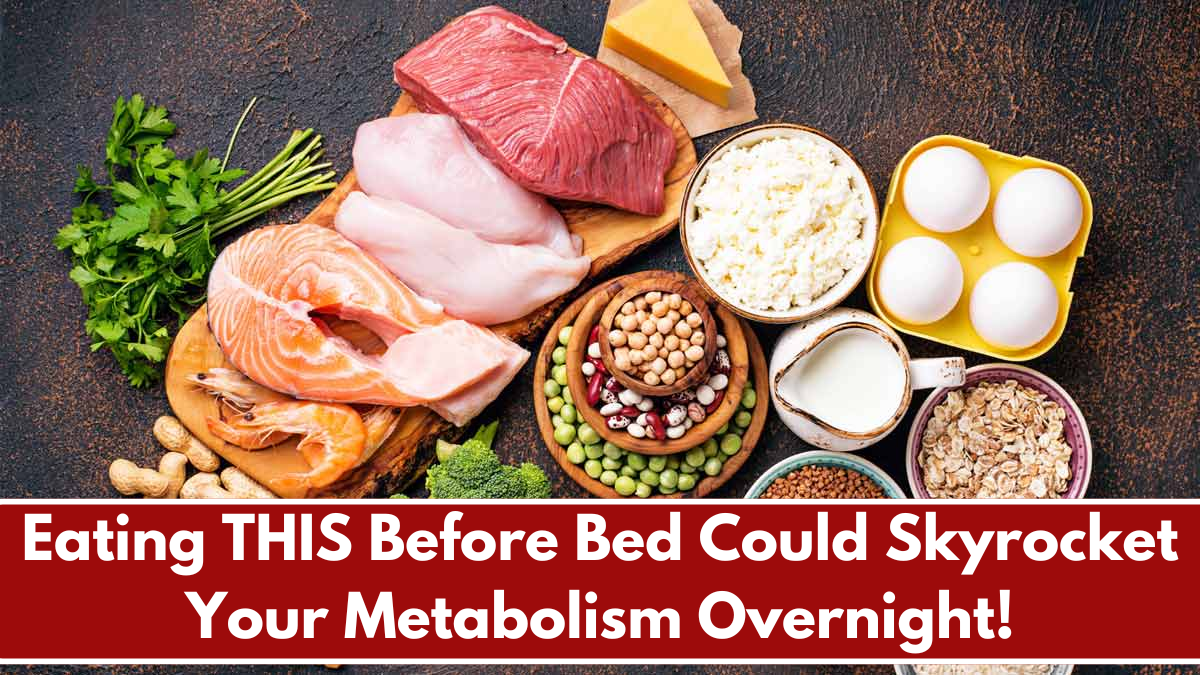Most people believe that eating before bed leads to weight gain and slows down metabolism. However, what you eat before sleeping can actually boost your metabolism and enhance fat burning overnight. While late-night snacking on processed foods can cause weight gain, consuming specific nutrient-dense foods before bed may help your body burn more calories while you sleep.
Your metabolism doesn’t stop when you sleep—it continues working to repair, digest, and fuel your body. The key is choosing the right foods that promote thermogenesis (heat production), regulate hormones, and keep your body in fat-burning mode throughout the night.
So, what is the one food that can boost your metabolism overnight? In this article, we’ll explore the best bedtime foods, the science behind nighttime fat burning, and how to optimize your metabolism for maximum weight loss.
The Science of Metabolism While You Sleep
Metabolism is the process by which your body converts food into energy. While many assume metabolism slows down during sleep, research shows that your body continues to burn calories at a steady rate, particularly during REM (Rapid Eye Movement) sleep.
Several key factors influence how well your metabolism functions at night:
- Muscle Mass: The more muscle you have, the higher your resting metabolic rate, meaning you burn more calories even when asleep.
- Hormones: Growth hormone, released during deep sleep, plays a vital role in fat metabolism and muscle recovery.
- Nutrient Timing: The foods you eat before bed can either promote fat burning or encourage fat storage.
By eating the right foods, you can trigger your body’s natural fat-burning processes, enhance digestion, and wake up feeling lighter and more energized.
The One Food That Skyrockets Your Metabolism Overnight
High-Protein Greek Yogurt
Greek yogurt is one of the best foods to eat before bed because it is:
- High in Protein: Protein requires more energy to digest, boosting metabolism through the thermic effect of food (TEF).
- Rich in Casein: Casein protein digests slowly, providing a steady supply of amino acids throughout the night, which helps muscle repair and recovery.
- Low in Sugar: Unsweetened Greek yogurt is low in sugar, preventing insulin spikes that lead to fat storage.
- Contains Probiotics: A healthy gut microbiome supports digestion and fat metabolism, aiding in weight loss.
Studies show that eating protein before bed enhances muscle protein synthesis and prevents overnight muscle breakdown. Since muscle burns more calories than fat, increasing lean muscle mass naturally raises your metabolism.
Other Powerful Nighttime Metabolism-Boosting Foods
Cottage Cheese
Like Greek yogurt, cottage cheese is high in casein protein, providing a slow-digesting source of amino acids to support muscle recovery and metabolic function. It also contains tryptophan, an amino acid that aids sleep quality, which is crucial for weight loss.
Almonds & Walnuts
A small handful of nuts provides healthy fats, protein, and magnesium, which supports deep sleep and muscle recovery. Magnesium plays a role in glucose metabolism, helping to stabilize blood sugar levels overnight.
Chia Seeds or Flaxseeds
These seeds are rich in fiber, omega-3 fatty acids, and protein. They help slow digestion, reducing nighttime hunger and keeping blood sugar stable to prevent fat storage.
Herbal Teas (Green Tea or Chamomile Tea)
Certain herbal teas contain metabolism-boosting compounds. Green tea has catechins and caffeine, which stimulate thermogenesis. Chamomile tea reduces cortisol, the stress hormone that contributes to belly fat storage.
Lean Turkey or Chicken
Lean protein sources like turkey or chicken help repair muscle overnight while keeping your metabolism active. Turkey contains tryptophan, which improves sleep and enhances fat-burning efficiency.
Eggs
Eggs are a complete protein source with essential amino acids that boost muscle recovery and fat oxidation. The choline in egg yolks supports liver function, helping break down fats more efficiently.
Dark Chocolate (85% or Higher)
Dark chocolate contains polyphenols that improve insulin sensitivity, reduce inflammation, and slightly increase calorie burn through thermogenesis.
The Worst Foods to Eat Before Bed
Just as some foods can speed up metabolism, others can slow it down and contribute to fat storage overnight. Avoid these foods before bed:
- Sugary Snacks (Cookies, Cakes, Ice Cream): High sugar intake leads to insulin spikes and fat storage.
- Refined Carbs (White Bread, Pasta): These foods are digested quickly, leading to increased fat accumulation.
- Fast Food & Processed Snacks: Contain trans fats and high sodium levels, causing bloating and sluggish metabolism.
- Alcohol: Disrupts sleep patterns and impairs fat metabolism.
How Sleep Quality Affects Metabolism
Your metabolism is directly linked to your sleep quality. Lack of sleep slows metabolic rate, increases hunger hormones (ghrelin), and lowers satiety hormones (leptin), leading to weight gain.
Tips for Better Sleep & Faster Metabolism
- Keep a consistent sleep schedule. Sleeping and waking at the same time every day improves metabolic function.
- Avoid blue light exposure before bed. Screens from phones and TVs interfere with melatonin production, reducing sleep quality.
- Engage in light exercise in the evening. A short walk or stretching session can help digestion and calorie burn.
- Sleep in a cool, dark room. A cooler temperature promotes deeper sleep and increases calorie burn.
- Avoid caffeine after 3 PM. Stimulants like coffee or soda can disrupt sleep cycles.
Eating before bed doesn’t have to lead to weight gain—if you choose the right foods, you can actually boost your metabolism and burn fat while you sleep. High-protein Greek yogurt, cottage cheese, nuts, and lean protein help stimulate overnight fat loss, support muscle recovery, and optimize metabolic efficiency.
On the other hand, sugary, processed, and high-carb foods before bed can slow metabolism, spike insulin levels, and encourage fat storage. By making smart food choices, improving sleep quality, and maintaining a healthy nighttime routine, you can wake up feeling lighter, more energized, and closer to your weight loss goals.
Try adding one of these metabolism-boosting foods to your nighttime routine and experience the difference!
FAQ’s:
1. Does eating before bed really slow down metabolism?
This is a common myth, but eating before bed does not necessarily slow down your metabolism. What matters most is what you eat and how much rather than when you eat. If you consume processed, high-sugar, or high-carb foods late at night, your body may store excess calories as fat, leading to weight gain. However, if you eat high-protein, fiber-rich, or metabolism-boosting foods, your body continues to burn calories as it digests and repairs itself overnight. In fact, consuming slow-digesting proteins can increase overnight calorie burn and muscle recovery, leading to a higher resting metabolic rate.
2. What foods should I eat before bed to boost my metabolism?
Certain foods can help increase metabolism and fat burning overnight. The best options include:
- Greek yogurt – High in protein, low in sugar, and contains probiotics for better digestion.
- Cottage cheese – Contains casein protein, which digests slowly, keeping metabolism active overnight.
- Almonds and walnuts – Provide healthy fats, magnesium, and protein, which aid metabolism and sleep quality.
- Chia or flaxseeds – High in fiber and omega-3s, these seeds support digestion and fat metabolism.
- Lean turkey or chicken – High-protein foods that promote muscle repair and fat burning.
- Eggs – Packed with protein and healthy fats, which help regulate metabolic processes.
- Dark chocolate (85% or higher) – Contains polyphenols that improve insulin sensitivity and thermogenesis.
3. How does sleep affect metabolism?
Your metabolism is closely linked to your sleep quality. When you don’t get enough sleep, your metabolism slows down, and your body struggles to regulate hunger hormones. Two key hormones affected by poor sleep are:
- Ghrelin: The “hunger hormone” that increases appetite.
- Leptin: The hormone that signals fullness.
When you’re sleep-deprived, ghrelin levels rise while leptin levels decrease, making you feel hungrier and more likely to overeat. Additionally, sleep deprivation increases cortisol, a stress hormone that promotes fat storage, especially around the belly.
4. Can eating protein before bed help with weight loss?
Yes, consuming high-protein foods before bed can actually aid weight loss. Protein has a high thermic effect, meaning it requires more energy to digest, increasing calorie expenditure. It also helps maintain and build muscle mass, which naturally raises your resting metabolic rate. Studies have shown that casein protein, found in Greek yogurt and cottage cheese, provides a slow-digesting protein source that keeps metabolism active overnight.
5. Does drinking green tea before bed help burn fat?
Green tea is well-known for its metabolism-boosting properties. It contains catechins and caffeine, which stimulate thermogenesis (heat production in the body), increasing calorie burn. While drinking green tea before bed can be effective, the caffeine content might interfere with sleep for some people. If you’re sensitive to caffeine, opt for decaffeinated green tea or chamomile tea, which helps reduce cortisol levels and improves sleep quality, indirectly supporting weight loss.
6. What foods should I avoid before bed to prevent weight gain?
Some foods can negatively impact metabolism and promote fat storage when consumed before bed. These include:
- Sugary snacks – Candies, cookies, and ice cream cause insulin spikes, leading to fat storage.
- Refined carbs – White bread, pasta, and pastries digest quickly, causing blood sugar imbalances.
- Fast food – Burgers, fries, and processed snacks are high in unhealthy fats and sodium, slowing metabolism.
- Alcohol – Interferes with deep sleep, reducing metabolic efficiency.
- Soda and sugary drinks – Contain high-fructose corn syrup, which disrupts fat metabolism.
7. How does muscle mass influence metabolism overnight?
The more lean muscle mass you have, the higher your resting metabolic rate (RMR). This means your body burns more calories, even while sleeping. Muscle tissue requires more energy than fat tissue, so people with higher muscle mass naturally have faster metabolisms.
To maximize muscle preservation and growth, consuming casein protein, lean meats, eggs, or nuts before bed can prevent muscle breakdown and support overnight fat-burning processes.
8. Can drinking water before bed help boost metabolism?
Drinking water, especially cold water, slightly increases metabolism because your body uses energy to heat the water to body temperature. Additionally, staying hydrated helps your body efficiently metabolize stored fat and flush out toxins.
However, drinking too much water before bed may cause frequent trips to the bathroom, disrupting sleep. Instead, drink a moderate amount of water in the evening but avoid excessive fluid intake right before bed to ensure uninterrupted sleep.
9. How can I naturally increase my metabolism overnight?
There are several simple ways to boost metabolism while sleeping:
- Eat a protein-rich snack before bed. Foods like Greek yogurt, cottage cheese, or turkey provide essential amino acids for muscle repair and fat metabolism.
- Get 7-9 hours of quality sleep. Poor sleep disrupts hormonal balance, leading to slower metabolism and increased fat storage.
- Maintain a consistent sleep schedule. Going to bed and waking up at the same time helps regulate metabolic processes.
- Keep your room cool. Studies show that sleeping in a cooler environment can increase the body’s production of brown fat, which burns calories to generate heat.
- Perform light physical activity in the evening. A short walk or gentle yoga session can aid digestion and increase overnight calorie burn.
- Reduce stress before bed. High cortisol levels slow metabolism and promote fat storage. Meditation, deep breathing, and herbal teas can help lower stress.
10. Can intermittent fasting improve nighttime metabolism?
Intermittent fasting (IF) is a popular approach that involves cycling between eating and fasting periods. When done correctly, IF can enhance nighttime metabolism and fat burning. The benefits include:
- Increased fat oxidation – Since the body isn’t digesting food, it taps into fat stores for energy.
- Better insulin sensitivity – Improved blood sugar control prevents fat storage.
- Boosted human growth hormone (HGH) production – HGH plays a crucial role in muscle growth and metabolism, especially during sleep.
If you follow an early time-restricted eating (TRE) schedule, such as eating your last meal by 6-8 PM and fasting overnight, your metabolism can remain efficient while promoting fat loss. However, if fasting disrupts your sleep or causes excessive hunger, consuming a small protein-rich snack before bed might be a better option.



